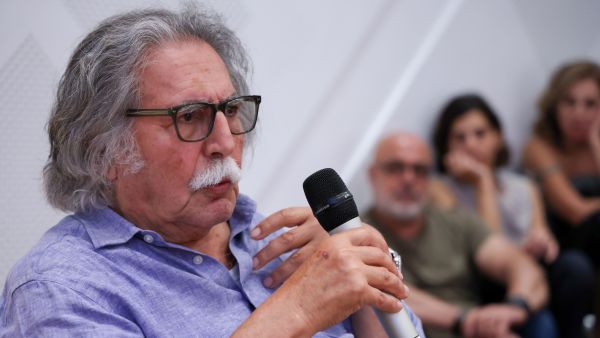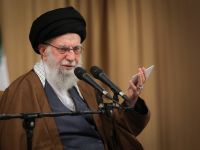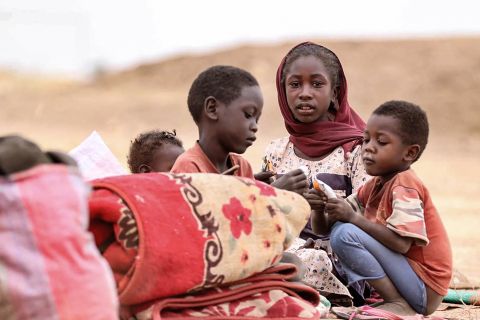AUB Hosts Conversation with Dia al-Azzawi on Art in the Face of Political Tragedy

The Department of Fine Arts and Art History at the American University of Beirut (AUB), with the support of AUB’s Sheikh Zayed Chair for Arabic and Islamic Studies, hosted a public conversation with the artist Dia al-Azzawi (born in Baghdad, 1939). The conversation was organized on the occasion of the opening of Azzawi’s show “False Witnesses” at Saleh Barakat Gallery.
He was joined by three interlocutors: Senior Lecturer in Art History at the University of Bristol Zeina Maasri; Regents Professor of Art History at the University of North Texas Nada Shabout, who is also visiting professor and senior investigator at al Mawrid Arab Center for the Study of Art at NYU Abu Dhabi; and Assistant Professor at the American University of Beirut Saleem al-Bahloly, who also moderated the event.
The conversation opened with Azzawi’s relationship to Beirut, which began in 1965 when Yusuf al-Khal, the owner of Gallery One, visited Azzawi’s first exhibition in Baghdad and invited him to do what would be the first of four shows in the Lebanese capital. At that moment, as Azzawi explained, he had just spent three months in prison following a coup by the Ba’ath Party in 1963 and had resolved to leave Iraq. The possibility of exhibiting in Beirut opened a window to the broader world for him; it led to another show in Kuwait at Sultan Gallery, founded by Ghazi Sultan, who by showing artists from across the region, was, on Azzawi’s account, bringing into existence for the first time something called Arab art.
The conversation continued with Azzawi describing his own experience in Arab art during the 1970s, beginning with the issuing of the New Vision manifesto, which declared a commitment to Arab art rather than Iraqi art and which insisted upon alignment with the Palestinian liberation struggle. Then continuing through his work on the al-Wasiti Festival in 1972 and the Biennale of Arab Art in Baghdad and Rabat, and curatorial work as a consultant at the Iraqi Cultural Centre at the end of the 1970s, particularly on poster exhibitions. Azzawi explained that the subject of the political work he made over that decade, within the framework of Arab art, had always been Palestine. He explained that he wanted his work “to document, but not directly, an event so that years later it would stand as an indictment of the powers” responsible.
Azzawi discussed his shifting relation to heritage situating his own practice in relation to that of other Arab artists. He described the origin of the daftar, or artist book, an art form that has provided him with a framework for working with Arabic poetry. It was in part inspired by Matisse’s artist book, Jazz, and in part by the history of manuscript illustration in Iraq, but it was born as an art form out of Azzawi’s reaction to the bombing of Baghdad in 1991. He subsequently introduced it to a younger generation of artists living in Iraq and struggling to find artistic materials under the sanctions of the 1990s.
Azzawi also spoke briefly about the works on show at Saleh Barakat Gallery. He explained that the title, “False Witnesses” refers to the politicians, both American and Iraqi, who tell lies for their own profit, and that the major inspiration for the show came from the October revolution in Iraq in 2019 when mostly poor Shia protested for a better life and were shot down by rich Shia.
Although the show at Saleh Barakat Gallery includes a set of charcoal drawings that Azzawi made following the bombing of a hospital in Gaza, as a kind of emotional reaction, Azzawi acknowledged that he was still trying to figure out “what work he can do on the catastrophe that has happened” which is not just the destruction of Gaza but also the moral catastrophe of the country where he lives, evident by the presence of English protesters of all ages and backgrounds at demonstrations.
A full recording of the conversation will be posted to YouTube soon.
Background Information
American University of Beirut
Founded in 1866, the American University of Beirut is a teaching-centered research university based on the American liberal arts model of higher education. AUB has over 9,000 students and over 1,200 instructional faculty members. The University encourages freedom of thought and expression and seeks to graduate men and women committed to creative and critical thinking, lifelong learning, personal integrity, civic responsibility, and leadership.







